|
|
|
Sort Order |
|
|
|
Items / Page
|
|
|
|
|
|
|
| Srl | Item |
| 1 |
ID:
079471
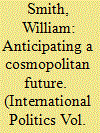

|
|
|
|
|
| Publication |
2007.
|
| Summary/Abstract |
The past decade has witnessed the emergence of numerous 'cosmopolitan' theories of humanitarian military intervention. These theories anticipate a more cosmopolitan future, where interventions will be authorized by new cosmopolitan institutions and carried out by reformed cosmopolitan militaries. The contention of my article is that despite the merits of these approaches, it is often difficult to discern whether and how cosmopolitan theories can inform assessments of interventions that take place in our non-cosmopolitan present. Through taking Jürgen Habermas's judgements of two recent interventions as a 'case study', I reflect on the considerations that might come into play when cosmopolitans attempt to translate their future-orientated theories into practical engagements with the world as it
|
|
|
|
|
|
|
|
|
|
|
|
|
|
|
|
| 2 |
ID:
079473


|
|
|
|
|
| Publication |
2007.
|
| Summary/Abstract |
The aim of this paper is to explore alternative ways of thinking about ethics in world politics beyond the polis, the cosmopolis, and this tired and totalising dichotomy. However, conventional forms of political criticism are said to be inadequate to the task because the dominant theories, logics and categories through which the 'beyond' might be formulated tend to be contaminated by this very dichotomy. Therefore, drawing chiefly on the insights of Jacques Derrida and Jean-Luc Nancy, I argue that new imaginaries are required. In particular, I suggest that the concept of singularity offers theorists of international politics an alternative site around which the realm of the ethico-political may be re-conceptualised.
|
|
|
|
|
|
|
|
|
|
|
|
|
|
|
|
| 3 |
ID:
079470
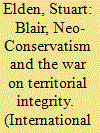

|
|
|
|
|
| Publication |
2007.
|
| Summary/Abstract |
This essay uses the war on Iraq and in particular the legal advice of the British Attorney General to explore two tensions.1 The first is between Blair's foreign policy with its 'ethical dimension' and call for humanitarian intervention by the international community and the project of the neo-conservatives in the US. The second is in the notion of territorial integrity, which means both the idea of territorial preservation and that within this territory a state is sovereign. The war on Iraq, which violated territorial sovereignty, was fought against a backdrop of preserving the existing territorial settlement, especially regarding the Kurds. While Blair and the neo-conservatives share an argument against territorial sovereignty as an unconditioned absolute, and hold a belief in the need for territorial stability, their positions differ on the mechanisms needed. Blair strove for an internationalist position; the neo-conservatives argue for US exceptionalism. Ultimately though, faced with a decision, Blair joined the US in violating a sovereign state's territorial integrity without international support
|
|
|
|
|
|
|
|
|
|
|
|
|
|
|
|
| 4 |
ID:
079468
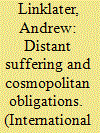

|
|
|
|
|
| Publication |
2007.
|
| Summary/Abstract |
How far does globalization extend the boundaries of community by bringing distant suffering directly into the lives of onlookers, and how far does the greater visibility of suffering arouse compassion and a willingness to help? Modern self-images that stress the growth of emotional identification between the members of the same society encourage the belief that similar attachments may develop at the level of humanity as a whole. Critics of this position emphasize deep-seated tendencies to remain indifferent to remote suffering. In the light of these differences, this paper asks whether the extension of human solidarity largely depends on the development of feelings of guilt or shame when harm is done to 'distant strangers' or when little is done to help them. It asks whether universal vulnerabilities to basic forms of mental and physical suffering create the possibility of global empathy and sympathy, and whether the idea of 'embodied cosmopolitanism' provides adequate normative foundations for collective action to reduce unnecessary suffering in distant places
|
|
|
|
|
|
|
|
|
|
|
|
|
|
|
|
| 5 |
ID:
079472
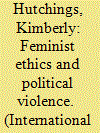

|
|
|
|
|
| Publication |
2007.
|
| Summary/Abstract |
This paper argues that the debates between different ethical perspectives within feminism cannot be resolved in principle. Nevertheless, these debates point to a different feminist way of thinking about ethics in world politics. This feminist perspective puts the distinction between 'ethics' and 'world politics' into question in relation to feminism's defining concern with the sources and effects of women's oppression
|
|
|
|
|
|
|
|
|
|
|
|
|
|
|
|
| 6 |
ID:
079474
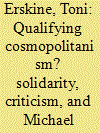

|
|
|
|
|
| Publication |
2007.
|
| Summary/Abstract |
For some, cosmopolitanism is a deeply troubling, even dangerous, ethical position. An 'embedded cosmopolitan' variation on this position would strive to take seriously the apprehensions of these critics by eschewing the impartialist perspective to which it is conventionally tied. Specifically, this proposed alternative would adopt a modified version of the particularist moral starting point espoused by so-called 'communitarian' political theorists. In order to retain its ethical cosmopolitan credentials, such a stance would have to achieve a moral purview that left no-one, whether compatriot or foreigner, ally or enemy, beyond either concern or comprehension. Trying to construct this qualified cosmopolitanism is a difficult and daunting task. By analysing the various attempts of the American political philosopher Michael Walzer to reconcile a radically situated account of morality (his 'view from the cave') with an inclusive and cross-culturally critical moral purview, this article aims to map the most promising route towards an embedded cosmopolitan position. At the same time, it endeavours to pay due attention to a much broader range of Walzer's writings than is generally acknowledged within the study of international relations
|
|
|
|
|
|
|
|
|
|
|
|
|
|
|
|
| 7 |
ID:
079469
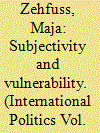

|
|
|
|
|
| Publication |
2007.
|
| Summary/Abstract |
When US President George W Bush and UK Prime Minister Tony Blair argued in favour of war with Iraq, they offered a variety of reasons ranging from the now infamous claim that the country possessed weapons of mass destruction to the need to effect regime change. Such arguments were roundly criticized by opponents of the war, because the claims were, even if true, not regarded as legitimate reasons for war or because the factuality of the claims was rejected in the first place. In contrast to such lines of critique this article does not consider whether these claims could be considered accurate or sufficient. Rather, it uses Judith Butler's critique of ethical violence to elucidate the political implications of speaking and acting ethically. In particular, it explores the problematic of subjectivity and vulnerability and suggests that arguments for the war cannot effectively be contested logically; rather we must highlight the way in which they produce what they claim to name
|
|
|
|
|
|
|
|
|
|
|
|
|
|
|
|
|
|
|
|
|